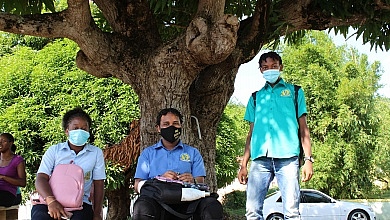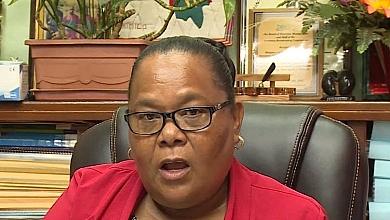PAHO Director says fight against COVID-19 pandemic must include chronic disease care

The Director of the Pan American Health Organization (PAHO), Carissa F. Etienne, Tuesday said the response to the COVID-19 pandemic in the Region of the Americas must include chronic disease care, as 1 in 4 people are at increased risk of poor outcomes from COVID-19 due to underlying non-communicable diseases (NCDs).
Noting that more than 2.4 million cases and over 143,000 deaths have made the Americas the epicenter of the COVID-19 pandemic, Dr. Etienne said during a media briefing today, “as cases continue to rise in our region, our efforts to protect those with underlying conditions must intensify.”
In South America, “we are particularly concerned that the number of new cases reported last week in Brazil was the highest for a seven-day period, since the outbreak began. Both Peru and Chile are also reporting a high incidence,” she said. For most countries in the Americas, “now is not the time to relax restrictions or scale back preventive strategies. Now is the time to stay strong, remain vigilant and aggressively implement proven public health measures,” Dr. Etienne said.
“We have never seen such a deadly relationship between an infectious disease and Non-Communicable Diseases. Some of the data are truly alarming. Especially for our region, where NCDs are pervasive,” she said. “We need aggressive preventive measures to protect people with diabetes, respiratory and cardiovascular diseases from the new coronavirus.”
Persons with diabetes are twice as likely to have severe disease or die, and 28 percent of cancer patients who contracted COVID-19 died, compared with 2 percent of overall patients, she said, citing recent studies. Smoking also increases the chance of severe disease from COVID-19.
Stay at home measures, disruptions in provision of health care services, as well as the fear of attending care facilities have resulted in reduced elective clinic visits and lower access to renal dialysis, cancer care, and delays in high priority treatments for patients with NCDs, Dr. Etienne said. Many health workers who normally provide care for people with chronic disease “have been redirected to the COVID-19 response, adversely impacting the timely diagnosis and treatment of NCDs,” PAHO’s Director added.
Lower access to care from disruptions in health care services “puts patients at higher risk of complications and death from diseases which we know how to treat,” and health systems must find ways to respond “or we will be faced with a parallel epidemic of preventable deaths of persons with NCDs,” Dr. Etienne said.
Prior to COVID-19, 81 percent of all deaths in the Region of the Americas were due to NCDs and 39 percent of these deaths were premature, occurring before 70 years of age. PAHO’s Director said it was important to find safe methods of delivering essential clinical care for people with NCDs during the pandemic. “For example, many countries are quickly scaling up telemedicine, prioritizing scheduled appointments to avoid crowded waiting rooms and providing services in novel ways.”
Dr. Etienne said that countries should ensure that supply chains for essential NCD medicines are protected and continue to function efficiently, and that these products are distributed to the people who need them.
“We also must ensure timely access to care for chronic diseases to prevent them from becoming life-threatening. PAHO is working with countries in the region and providing guidance to help plan and implement these measures. As cases continue to rise in our region, our efforts to protect those with underlying conditions must intensify,” she emphasized.
This article is copyright © 2020 DOM767








